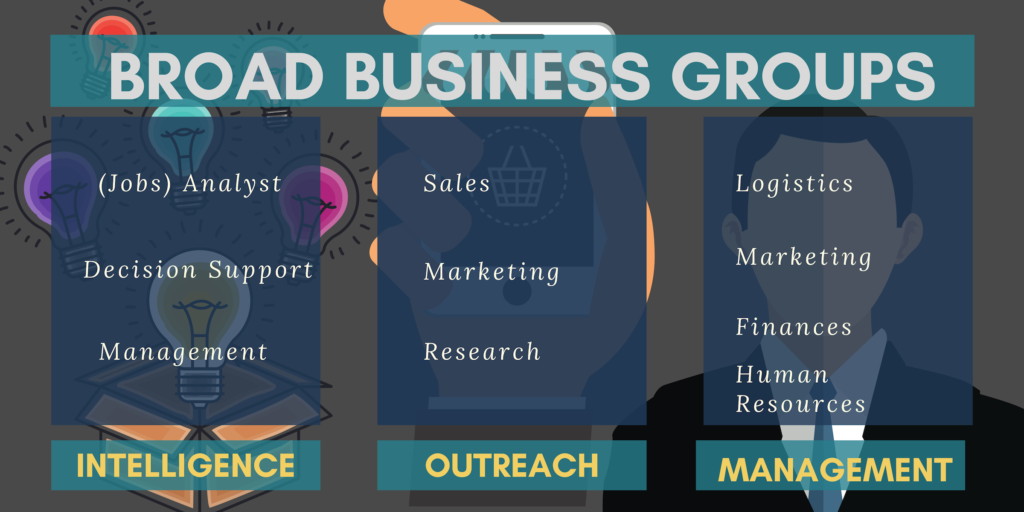![]() At their core, many of the most important challenges our society faces are business problems. From how to prolong life and boost quality of life, to how to ensure airplanes are well maintained and safe for use, to ensuring your child obtains adequate attention at school, business thinking makes the world around us work.
At their core, many of the most important challenges our society faces are business problems. From how to prolong life and boost quality of life, to how to ensure airplanes are well maintained and safe for use, to ensuring your child obtains adequate attention at school, business thinking makes the world around us work.
While there are of course many other very crucial skills. Few skills work in a vacuum entirely separate from business. The best painters can’t work without a supply chain that provides their paint brushes. The best teachers need the help of skilled managers organizing support services in school. The best doctors need systems in place to track billing, obtain cutting-edge equipment, and market their places of work. In short, most of the world we know relies on skilled business men and women.

If you find yourself interested in complex practical problems and think you have a knack for solving them, business may be just the career for you. And for many, a Master of Business Administration (MBA) is the “go-to” business degree.
MBAs have been popular for quite a while among large employers and entrepreneurs. Many MBA programs are quite versatile and allow students to specialize in a wide range of areas. More than that, however, is the fact that MBAs can be obtained quickly and provide a great graduate-level understanding of business fundamentals.
While it is possible to self-educate in areas as diverse as marketing, human resources, business law, accounting, finance, and logistics, MBAs can accelerate this process in a “tried-and-true” degree type.
Have additional questions about MBA degrees? Check out some of our general FAQ coverage below:
- How Long Does It Take to Get an MBA?
- Is There Any Math Required for an MBA?
- What Is the Salary Potential for Someone With an MBA?
- What Is the Difference Between an MBA and a Master’s in Organizational Leadership Degree?
- What Is the Difference Between an MBA and a Master of Finance Degree?
- What Are the Benefits of Earning a Master’s in Finance Degree Instead of an MBA?
- What Are the Highest-Paying Business Entry-Level Jobs?
What Can I Do With a Master of Business Administration (MBA) degree?
MBAs mean different things to different candidates and different employers. Some undergraduate students will proceed directly from their baccalaureate degree to an MBA. In this case — with little or no prior work experience — an MBA will often help recipients to land an entry-level job and progress more quickly into leadership.
For other MBA seekers, they may have already held a job for several years. In fact, the average MBA seeker is in the middle of their career. These MBA candidates may find that an MBA helps to increase their pay and responsibilities at their current job, or that they are more easily able to apply for a job with slightly more seniority.

Either way, MBAs tend to qualify students for a variety of entry level and project manager positions. As one moves up through a corporate or organizational structure, MBAs often become more and more common.
Think you might be interested in pursuing an MBA? Be sure to check out DegreeQuery’s rankings of The 25 best online MBA degree programs today!
For more MBA-specific FAQs from DegreeQuery, check out the below resources:
- What undergraduate degree is best for an MBA?
- How Long Does It Take to Get a Business Degree?
- Is an Online MBA Easy?
- Will An Online MBA Help My Career?
- Are Online MBAs Worth It?
- Are Online MBAs Respected?
- How Much is an Online MBA?
- Are Online MBAs Accredited?
- What is a MBA?
- What Degree do I need to become a Contract Specialist?
- What is the Difference in a Doctorate of Business Administration vs. a Ph.D. in Business?
- How Many Jobs Are Available in Finance?
- How Much Can I Make With a Degree in Digital Marketing?
What Jobs Can You Get With an MBA?
For those early in their career, MBAs help make candidates “shoe-ins” for a variety of entry-level and mid-career positions. Some of the most common positions held by MBA recipients include the following:
- Business Analyst
- Product Owner
- Product Manager
- Sales Representative
- Sales Manager
- Marketing Specialist
- Marketing Analyst
- Project Manager
These jobs can be grouped into three groups: business intelligence, outreach, and management.

Entry-level business intelligence centered roles include business analyst, marketing analyst, and marketing specialist roles. These careers center around the gathering and analysis of data to support decision-making in business.
MBA programs help to prepare students for these roles to varying degrees and depending on what students within an MBA program specialize in. Most MBA programs, however, will provide a basic overview of intelligence gathering methods, statistical analysis methods, and research presentation methods.
Research for these roles can include the use of big data, machine learning, smaller data sets using SQL or Excel, or the synthesis of interview results with colleagues, customers, and other stakeholders.
If you find yourself good at navigating ambiguous situations, driven to find interesting insights into massive amounts of data, and analytically minded, these positions can be a great choice after completing an MBA.
What’s more, business intelligence roles are rewarded quite well monetarily. Entry-level business analysts earn an average of close to $60,000, with mid to late-career business analysts sometimes earning twice that. Marketing specialists and analysts earn between $50,000-$70,000. And for those to excel in their roles and have leadership qualities, management positions in each of these disciplines can earn much more. (Find out more about what degree you need to be an intelligence analyst.)
Broadly speaking, a number of business career paths deal with outreach. The form of these roles will vary depending on whether an organization is for-profit, non-profit, or governmental. Additionally, outreach roles vary depending on whether an organization sells a product or service that is business to business (B2B) or business to consumer (B2C) facing.
Some of the most common outreach roles across organization types include the job titles of sales representative, customer representative, marketing coordinator, and public relations specialist.
Sales representatives use a variety of tactics to reach out to potential clients, close a sale, and upsell customers. Sales representatives are often responsible for gathering potential customers, though this role may also fall on customer acquisition roles. Once potential clients have been identified, sales representatives may “cold call,” email, text, or set up meetings with potential customers. In some cases, sales representatives will give presentations or man booths at conferences or in physical storefronts.
Sales is a crucial part of nearly every for-profit organization. And in most medium to large organizations, there is a great deal of opportunity for advancement for those that work hard and excel in these roles.
A second role related to outreach can be found in entry-level marketing jobs. Instead of reaching out to clients one-on-one, marketers ensure that the assets and properties that represent a company help to sell. Broadly speaking, there are two forms of marketing: inbound and outbound. Inbound marketing focuses on generating interest and increased orders for an organization by driving potential users into sales funnels. Inbound marketing is most often performed online, and may be done by focusing on ranking for certain searches in search engines, by placing content on popular sites, or through online advertising.
Outbound marketing is what many people traditionally think of as marketing. This form of marketing may book ads in periodicals, place billboards, or host givaways.
Both forms of marketing are readily employed in a wide variety of organization types, and many MBA programs have concentrations on marketing for those interested in pursuing this form of business career.
Finally, public relations specialists help to manage interactions between an organization and the public to ensure outcomes that are acceptable to a business. Public relations may help in crafting a certain “image” for a brand, step in in times of crisis with carefully crafted statements, or gauge the attitudes of consumers and other stakeholders to ascertain if sentiment may hinder or help business objectives.
Think you might be interested in pursuing an MBA? Be sure to check out DegreeQuery’s rankings of The 25 best online MBA degree programs today!

The third and perhaps most common business role that MBAs help to prepare students for is in management. While many people working in business will likely begin in one of the previously mentioned business roles, as they gain experience and education they will likely be approached to enter management.
Each division of a business or large organization has managers. Common management types that can be aided by obtaining an MBA include the following:
- Project Manager
- Program Manager
- Product Manager
- IT Manager
- Software Manager
- Logistics Manager
- Marketing Manager
- Accounting Manager
As a whole, managers are some of the best paid positions in the business world. While highly specialized technical workers such as experienced engineers or data scientists may make more than many managers, this is a rare occurrence. The average salary for common management positions is listed below:
- Project Manager: $72,481
- Program Manager: $128,237
- Product Manager: $123,994
- IT Manager: $83,356
- Software Manager: $134,000
- Logistics Manager: $98,320
- Marketing Manager: $100,053
- Accouting Manager: $102,596
Think you might be interested in pursuing an MBA? Be sure to check out DegreeQuery’s rankings of The 25 best online MBA degree programs today!
Types of MBAs
Depending on the stage of your career you’re in as well as what sort of role you would like to work in, there are many ways to customize an MBA to fit your needs.

Presently there are three main “types” of MBAs each aimed at professionals in different stages of their careers.
The typical MBA is aimed both at experienced professionals and those that have yet to leave school. These MBA programs often require 2 years of full-time study and assume that students need foundational business courses at the graduate level. Many “traditional” MBA programs are open to students with zero work experience. This doesn’t mean that these programs are easy to gain admission to. Rather, some traditional MBA programs require stellar undergraduate attendance, GMAC scores, and recommendations.
The largest number of MBA programs do fall into this “traditional” MBA category. Many programs of this type are quite flexible, and are available to the widest range of candidates. Students in these programs may be allowed to take courses at night, on the weekends, fully online, or in blended formats that allow for students to largely study from home.
A second type of MBA program is a professional MBA. Professional MBAs are available to students are available to students that have 2 or more years of experience. The typical student of a professional MBA actually has 5 or more years of experience, and has a mid-career ladder title such as a low level of management or a slightly advanced title.
Due to the business experience that degree candidates bring to professional MBA programs, many programs assume they do not need to cover as many foundational topics as in traditional MBAs. This means that professional MBAs can often be gained in less time, with less coursework, and with greater flexibility than traditional MBA programs.
The third form of MBA is an executive MBA (eMBA). Executive MBAs are generally reserved for students that hold 5 or more years of experience at the managerial level. Two of the main differences between executive MBAs and other MBAs are that courses are often held on the weekend or at night, and tuition costs are often partly or fully paid for by the employer of the student.
A free education? Yep, many executive MBA programs are paid for by employers because the eMBA candidate has been identified as a future or continued leader in the company. Similarly to traditional MBAs, Executive MBAs also require 2 years of study, though often require less coursework than traditional MBAs.
Think you might be interested in pursuing an MBA? Be sure to check out DegreeQuery’s rankings of The 25 best online MBA degree programs today!
MBA Specializations

Once you’ve determined the “type” of MBA that you may be interested in, you’ll want to consider if you would like to pursue a specialization or concentration.
Generalist MBAs
While most MBA programs today offer a range of specialization options, traditionally MBAs were all largely generalist programs. Today many programs still offer a “general” MBA option.
MBAs with specializations and Generalist MBAs typically just differ in one way. Where an MBA with a specialization will require 3-6 courses in a particular subject matter, generalist MBAs will replace these concentration courses with courses distributed across the spectrum of business knowledge. Instead of a cluster of courses that will push you in one direction, generalists will be exposed — at a graduate level — to a wider range of business disciplines.
Finance MBAs
MBAs with finance concentrations are likely the most popular MBA specialty. Broadly speaking, finance is the study of two things: (1) how money is managed, and (2) how needed money is acquired.
Even though it can be reduced to two central focal points, finance is a broad academic discipline that covers topics including banking, credit, forms of investment, stocks, bonds, taxation, and more.
At the MBA level, a common grouping of courses that students may choose from in a finance concentration includes the following:
- Investments
- Corporate Financial Reporting and Analysis
- International Finance
- Global Business Conditions
- Financial Forecasting
- Behavioral Finance
- Capital Markets and Investment Planning
- Communication in Finance
- Advanced Corporate Finance
Marketing MBAs
Nearly every organization of a certain size has a marketing component. And today, there are more mediums through which to push corporate messaging and interaction with clients than ever before. Today marketing MBAs will often specify whether or not they are focused on more traditional outbound marketing, or whether they are focused on digital marketing. With that said, digital marketing has become so predominant that virtually all marketing MBAs at least include a course or two related to digital marketing.
Common courses that may be taken as part of a marketing concentration in an MBA include the following:
- Marketing Research Methods
- Glocal marketing
- Consumer Behavior research
- Integrated Marketing Communication
- Brand Management
- Advertising
- Online Marketing
- Product Management and Marketing
- Public Relations
While most marketing MBAs focus generally on marketing, some also promote courses of study for students looking to enter into particular roles. Common marketing job types that some MBAs allow focal areas include:
- Sales
- Promotion
- Advertising and Public Relations
- Brand Management
- And Market Research
Information Technology MBAs

It should come to no surprise to potential MBA candidates that information technology-related businesses are a massive opportunity for savvy business graduates. While technological services or advances may be at the heart of what IT businesses do, business insight, marketing, and managerial insight are central to the overall success of these businesses.
“Work fast and break things” expresses a sentiment commonly heard in companies run according to software development maxims. This unique management style refers to the overwhelming trend of releasing software as a minimum viable product (MVP). Once the product is released, it will inevitably break. By fixing what breaks, software development continuously hones their product and knows exactly what to focus on.
Learn more about what degree you need to be an information technology specialist.
This management style among others requires a uniquely trained manager. For those seeking an MBA in information technology, concentration courses will likely include some combination of the following:
- Database development and applications
- Ecommerce Management
- Emerging Technologies
- Data Analytics
- Project Management
- Information Assurance Strategies
- Decision Support Systems
International Business MBAs
It’s hard to find corporations above a certain size that aren’t multinational, or at the very least don’t partner with multinational corporations. This has brought about an ever-increasing need for professionals with the right foundational knowledge to operate in multinational environments. This may include knowledge of how to deal with employees or stakeholders from different cultures, different marketing tactics for different locations, knowledge of how international markets work, or knowledge of business laws in foreign nations.
If you have a desire to work abroad, get to travel a great deal for your work, or chase opportunities in international markets, an international business MBA can be a great option. Below are some of the most common courses that are included in international business MBA concentrations.
- International Financial Management
- Global Marketing
- Chinese Competitive Strategy
- Multicultural Management
- International Business
- Study Abroad / Immersion Trips
- Focus area on one part of the world
Operations Management MBAs
While each business division is important to the overall success of a corporation, perhaps no other discipline is more important to the staying power a business than operations management. Operations management is a multidisciplinary field that makes sure what is supposed to be produced, is. Operations managers plan, organize, supervise, and document the provision of services and products. They’re at the heart of making sure what should be delivered is delivered.
The two central components of operations management are logistics and supply chain management. Both of these disciplines are covered in common courses within an operations management MBA concentration (listed below):
- Operations Research
- Project Management
- Lean Management
- Supply Chain Management
- Logistics Management
Leadership MBAs

While some managers specialize on industry-specific skills or technical analysis, others opt to jump right to the heart of management in their education: leadership. Leadership MBAs are multidisciplinary and deal with human resources, the psychology of workers, crafting a vision for organizations, and other facets of management.
While there are many managers that hold technical skills in the business division in which they manage, many fewer approach true leadership. And organizations are constantly seeking those with leadership qualities to join their rankings.
Popular courses within a leadership MBA specialization include:
- Innovation and Risk
- Operations Management
- Effective Leadership
- Strategic Thinking
- Organizational Change
- Strategy
- Entrepreneurship
Entrepreneurship MBAs
Sometimes it can feel like it takes a force of nature to get a business up and running of your own effort. What it really takes is the proper interdisciplinary skills related to entrepreneurship. Entrepreneurship as an academic discipline is relatively new. The discipline focuses on early-stage initiatives and particularly on funding, marketing, and analysis of opportunities.
Common courses included in entrepreneurship MBA concentrations include the following:
- Innovation Management
- Technology Management
- Discovery of New Ventures
- Managing Change
- Funding of New Businesses
- Intellectual Property Law
Corporate Social Responsibility (CSR) MBAs
Depending on the organization you’re a part of, a distinct portion of your organization’s mission is likely related to some social responsibility. As organizations grow, social responsibility can be a crucial part of your public relations strategy, relations with stakeholders, and overall objectives.
A few of the common courses you may take in a corporate social responsibility-related MBA may include:
- Global Social Impact
- Research on Social Impact
- Sustainable Enterprise
- Sustainability Audits
- Corporate Ethics
